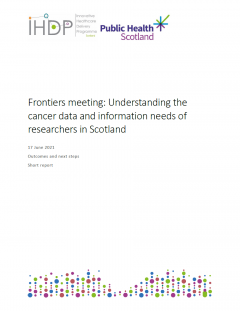BLOG: Safe and secure access to cancer data for researchers: Reflections from our cancer researcher workshop | Dr Fi Strachan
After our online workshop to uncover Scottish cancer researchers’ data needs, our Chief Operating Officer, Dr Fi Strachan reflects on what we learned from the event and the next steps
Access to healthcare data is an important part of understanding the patient journey and in tracking the impact of treatments and new interventions. However, a range of challenges can be faced when trying to access data to address important clinical questions: from technical issues to data governance.
Using data virtualisation, the Scottish Cancer Registry and Intelligence Service (SCRIS) overcomes some of these challenges by removing the need to move data from different systems. SCRIS, a collaborative project between the Innovative Healthcare Delivery Programme (IHDP) and Public Health Scotland (PHS), allows clinical teams to securely access national cancer datasets from across Scotland to support improvements in clinical services.
As part of the ongoing development of SCRIS, we hosted an online workshop event to find out what is important to those working with data in cancer research and explore their views on SCRIS and the SCRIS dashboards. We gathered feedback from researchers working across Scotland, on different tumour types and with varying data needs.
Cancer Researchers’ viewpoints
One of the key benefits highlighted of being able to access the data in SCRIS was the ability to combine datasets safely and securely through the dashboards. This would allow safe and secure access to data from a broader patient population than researchers may currently have access to.
Sharing of best practice and collaboration with researchers in other settings and other boards were also highlighted as benefits of SCRIS’s ability to link data across Scotland.
In addition to the advantages of accessing linked datasets, there was also some discussion around accessing well-curated data. Learning from others with experience in using the data was seen as a benefit in terms of understanding the data and how best to interpret it.
Future steps
Based on the feedback we have gathered, the SCRIS development team now have insight into the data needs of the cancer research community in Scotland.
Some next steps include:
- The continued development of the Cancer Intelligence Platform (CIP). This will bring all nationally held Scottish cancer datasets into one place so they can be more efficiently and analysed by PHS analysts, and, in the future, wider audiences.
- The vision to improve appropriate access for all our stakeholder groups and identify appropriate ethics and governance approval routes.
- The CIP is being designed to support a wide range of analytical tools so once access is granted users should be able to connect with their analysis application of choice.
For the benefit of cancer patients
We have plans to run similar events with patient groups to find out about what matters to them. We aim to raise awareness of how data is managed and how it helps to create improvements for everyone affected by cancer, as well as finding out more about patients’ views on how their data is used. We will also continue discussions with researchers and clinical teams.
By hosting these events, and by learning more about what is important to researchers and patients in this area, we hope to play our part in changing the way data is used. We see the benefits of using data to transform patient care: diagnosis, service and treatment improvements. Giving a network of researchers secure access to data can enable them to ask questions to improve our understanding of cancer in Scotland. By being part of these important data conversations, patients will contribute to developments in how we access data about their cancer journey and have a better understanding of how data can help improve cancer care and services across the country.
We’re all aiming for the same thing: better outcomes for those with cancer.

Read the report
You can read the short version of the report on our cancer researcher workshop.
Alternative formats
We are aware that this report may not be accessible for all users in PDF format. If you require this document in an alternative format, please email us. The full narrative version of this report is also available on request.
We’ll follow up on this event with ongoing discussions with researchers and clinicians working in this area. If you’d like to hear about future events or discussions aimed at researchers, sign up to IHDP's mailing list.
Scottish Cancer Registry and Intelligence Service
Find out more about the Scottish Cancer Registry and Intelligence Service on the Public Health Scotland website.

